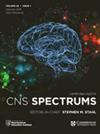Computational fluid science curriculum reform on students with obsessive-compulsive disorder
IF 3.4
3区 医学
Q2 CLINICAL NEUROLOGY
引用次数: 0
Abstract
Background Computational fluid science, as an interdisciplinary field, plays an increasingly important role in modern engineering and scientific fields. With the rapid development of technology and the gradual reform of education, the teaching methods and content of computational fluid science courses should also be updated to meet the needs of different student groups. Students with obsessive-compulsive disorder (OCD) may face specific psychological and cognitive challenges during their learning process, which may affect their understanding and mastery of the knowledge in computational fluid science. The research aims to explore the specific impact of computational fluid science curriculum reform on OCD students and provide targeted suggestions for educators to better meet the learning needs of these students. Subjects and Methods The study randomly divided 106 college students with OCD into an experimental group and a control group with same number in each. The control group received routine teaching; The experimental group was taught on the basis of a curriculum reform of computational fluid science. The study used the Yale Brown Obsessive Compulsive Scale (Y-BOCS) to assess the degree of changes in students’ obsessive-compulsive disorder. Results In the measurement before the experiment, the degree of students’ OCD symptoms was relatively severe, but the difference between the two groups was not significant ( P >0.05). After the experiment, the degree of obsessive-compulsive disorder in the experimental group was significantly improved and significantly lower than that in the control group ( P <0.05). Conclusions The curriculum reform of computational fluid science can effectively alleviate students’ OCD symptoms and improve their learning outcomes. Acknowledgement The research is supported by: Leshan City Science and Technology Bureau key research project (No.21GZD029).强迫症学生计算流体科学课程改革
计算流体科学作为一门交叉学科,在现代工程和科学领域发挥着越来越重要的作用。随着科技的飞速发展和教育的逐步改革,计算流体科学课程的教学方法和教学内容也应不断更新,以适应不同学生群体的需要。患有强迫症的学生在学习过程中可能会面临特定的心理和认知挑战,这可能会影响他们对计算流体科学知识的理解和掌握。本研究旨在探讨计算流体科学课程改革对强迫症学生的具体影响,并为教育者提供有针对性的建议,以更好地满足这些学生的学习需求。研究对象与方法将106名大学生强迫症患者随机分为实验组和对照组,两组人数相同。对照组接受常规教学;实验组在计算流体科学课程改革的基础上进行教学。该研究使用耶鲁布朗强迫症量表(Y-BOCS)来评估学生强迫症的变化程度。结果在实验前的测量中,学生的强迫症症状程度相对较重,但两组间差异无统计学意义(P >0.05)。实验结束后,实验组的强迫症程度明显改善,明显低于对照组(P <0.05)。结论计算流体科学课程改革能有效缓解学生强迫症症状,提高学生学习效果。本研究得到乐山市科技局重点研究项目(21gzd029)的支持。
本文章由计算机程序翻译,如有差异,请以英文原文为准。
求助全文
约1分钟内获得全文
求助全文
来源期刊

CNS Spectrums
医学-精神病学
CiteScore
6.20
自引率
6.10%
发文量
239
审稿时长
>12 weeks
期刊介绍:
CNS Spectrums covers all aspects of the clinical neurosciences, neurotherapeutics, and neuropsychopharmacology, particularly those pertinent to the clinician and clinical investigator. The journal features focused, in-depth reviews, perspectives, and original research articles. New therapeutics of all types in psychiatry, mental health, and neurology are emphasized, especially first in man studies, proof of concept studies, and translational basic neuroscience studies. Subject coverage spans the full spectrum of neuropsychiatry, focusing on those crossing traditional boundaries between neurology and psychiatry.
 求助内容:
求助内容: 应助结果提醒方式:
应助结果提醒方式:


